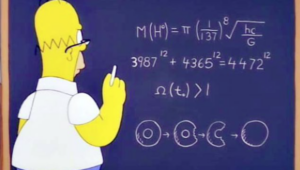
The Simpsons has been ahead of its time since its inception, a forerunner of modern and post-modern television comedy from the moment Homer, Marge, Lisa, Bart and Maggie became the yellow faces of primetime. What’s surprising the Internet this week is that the Matt Groening animated series, now in its 26th season, was also ahead of its time in advanced particle physics.
In 2012, with help from the multi-billion dollar miles-wide Large Hadron Collider, scientists finally discovered the Higgs boson, the so-called “God-particle” that defines mass for all known matter. But apparently, Homer came very very close to figuring it out on his own in 1998’s episode The Wizard of Evergreen Terrace. The screenwriter of that season nine episode was David X. Cohen, a self-proclaimed math nerd known to sneak in obscure scientific and mathematic equations into The Simpsons and his own series, Futurama. The equation on the board came from a friend of Cohen’s and turned out to be an eerily accurate prediction of the particle’s long-sought after mass.
Since being reported in The Independent, Homer’s prophecy has gone viral, another step in The Simpsons sudden return to cultural relevance since launching its own streaming service with FXX last summer. Since then, fans have made trending topics of canon-breaking episodes, started popular podcasts reviewing each episode, and—just last month—formed theories that Homer has been in a coma since 1993. It just goes to show that the series is still as talked about as it was when it first aired in 1989—a true testament to its cultural legacy.